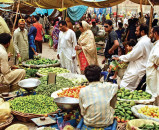Environment: Vicious circle
A visit to Keti Bandar shows that the ecology is inextricably linked to the local economy.

A four-hour journey from Karachi on broken roads brought me to the heart of the Indus Delta — the fifth-largest delta system in the world — home to an extensive network of creeks, estuaries, marshes, mudflats, swamps and mangroves forests. Lately, this environmental resource has fallen prey to overfishing, opportunism and neglect. Though some organisations like the WWF have made strides in the delta, the fate of this delicate ecosystem is anything but assured, endangering the lives and livihoods of the villagers who call it home. As I based myself in the World Wildlife Fund’s office in Samoo Goth, a village near the once prosperous port city of Keti Bandar, I was prepared to investigate how far sustainable, eco-friendly policies for economic and social uplift could go in benefiting this area.
The past is another country
Hardly a hundred years ago, Keti Bandar was known for its abundance of red rice, fish, bananas, timber and livestock. Today, it is a dilapidated town, a shadow of its past glory. “There was a time when the people of Keti Bandar were so affluent that they had investments in Karachi and used to loan money to traders there,” says the taxi driver who drives me to Gadho, a town 50 kilometres away from Keti Bandar.
Near Gadho, I get the opportunity to participate in a WWF-sponsored local festival, which kicks off with a display of malakhra — a form of wrestling where a participant tries to throw his opponent on the ground by tightly gripping his loincloth. According to Ghulam Rasool Khatri, who manages the WWF Indus Delta camp office, the festival “is a highlight for people living in the area.” It starts with the Urs of Bukhari Shah, a local saint, includes folk singing, Sufi poetry, malakhra, and concludes with a mass banquet.
The wrestlers participating in the event are mostly men from the local fisherfolk community, who pursue wrestling as a hobby. The festival comes to a close at sunset and the crowd of over 600 people disperses after an eventful day. Khatri is happy with the turn out and emphasises how these events help increase awareness about WWF-run projects.
However, despite last night’s jovial atmosphere, all is not well in Keti Bandar when we arrive in town the next day. My hosts Umair Shahid and Nadeem Sheikh tell me that Keti Bandar’s residents have had to move three times in the last 20 years because of rising sea levels. “Keti Bandar was deep inland before and the sea was further down south. Today, the sea is almost upon us, trying to gulp up this huge swathe of land,” says Umair, a natural resource management officer.
Keti Bandar’s former rice market, which used to bustle with rice traders and buyers coming from places as far as Karachi and Bombay, lies deserted. We set out for the nearby island settlement of Kharioun by boat, and my hosts tell me that the Indus River has changed its course many times, creating a unique network of more than a dozen major creeks and scores of minor ones, before flowing into the Arabian Sea. The delta, which has long been deprived of fertile sediment usually deposited by flooding, was revived last year by the unprecedented flooding in Pakistan. Though it devastated man-made settlements, the flood also replenished the water table and breathed new life into the region’s fragile eco-system.
“Our miseries are as deep as the ocean,” says Ghulam Dablo, headman of the Kharioun village, as people gather in his house to meet our team. Kharioun is located in the Hajamro Creek and it takes 15 minutes by boat to reach this island from Keti Bandar. Hardly a metre above sea level, this village of 35 households is rife with poverty and socio-economic problems. The entire population relies solely on fishing for sustenance and is plagued with loans that have astronomical interest rates. Children inherit debt from their parents and the vicious cycle of poverty repeats itself endlessly. This is mostly because of middlemen and loan sharks, to whom fishermen owe thousands of rupees. The village head himself owes more than Rs600,000 to middlemen based in Keti Bandar. According to Nadeem Sheikh, the middlemen buy the catch from poor fishermen at ridiculously low prices and sell the fish to traders in Karachi and other cities for a profit of about 200-500 per cent. “These poor fishermen owe the middlemen a lot of money, so they have no choice but to sell their catch to these people. If they don’t, the middlemen will seize their boats and fishing nets,” says Sheikh who himself hails from a fishing community.
The villagers also complain of rocketing fuel prices that have a direct impact on their livelihoods. They mock politicians for not taking care of them once they get their votes. “The government is literally pushing us into the sea. Loan sharks visit us every single day while the politicians come to us once in five years to beg for our votes,” says a frustrated fisherman.
The situation only gets worse when a storm or cytclone hits the area. “Our thatched roofs are blown away and our belongings get strewn in the water,” says Ghulam Dhabo as he lashes out at relief and rescue operations. “We receive little or no aid and are literally on the streets when we are evacuated from our village.” Villagers appeal for a permanent shelter that can shield them from extreme weather and consequent destruction every year, but to no avail.
Though the village benefits from a WWF project that provides electricity generated by solar panels and wind turbines to the 35 households, the absence of a school and a dispensary decimates the chance of a real change in their lives. Children in the village grow up illiterate and are not able to break the vicious cycle of poverty, ignorance and exploitation.
Downstream blues
At a nearby creek, a mangrove plantation project is in full swing, headed by Mohammed Ayub, an award-winning conservationist and mangrove expert. Historically, an area of 1,600 square kilometres in the Indus Delta was covered with mangroves. The mangroves provided shelter to a variety of marine life including fish, shrimps, crabs and migratory birds. The tropical tree not only protects the coastline from erosion, it also acts as a natural physical barrier to cyclones. Now, however, a shortage of fresh water, pollution and over-grazing by cattle is rapidly reducing the size of the forest.
It is a common misconception that fresh water flowing from the Indus River is a massive waste of a resource and should be utilised somehow. But the fact is that the stoppage of fresh water in the Indus delta, thanks to the construction of major dams and irrigation canals built in Punjab and northern Sindh, has practically lead to the destruction of the delta’s fragile eco-system. According to various reports published by the water and irrigation authorities, the water that flows into the delta today is almost one tenth of what it used to be in 1947, when the mighty Indus unleashed a heavy flow of around 80 million acre feet (Maf) into the ocean.
According to Umair Shahid, a graduate of Marine Sciences from the University of Karachi, reduced flow of freshwater from the Indus has resulted in the near extinction of several fish and marine species, migration of birds and wildlife, and the breakdown of the delta’s unique eco-system, along with a severe impact on human settlements.
Simple solutions
Nadeem Sheikh proposes a solution to the community’s problems. “It would really help if a fishery with a cold storage facility is opened in Keti Bandar. The fishermen could then store their catch and sell it directly to traders who give them their asking price,” suggests the political science graduate-turned-socio-environmental activist. “They do not get a good price for their catch thanks to the exploitation of the middle men. My proposal will give them a better alternative as all they’ll have to do is to come from the sea with all their catch and sell it at market rates.”
In contrast to the Dablos in Kharioun, their clansmen in Meeru Dablo village in Keti Bandar are altogether a different lot. They’re literate and are getting involved in crab farming and prawn cultivation. The credit for the change in fortune goes to Saleem Dablo, a charismatic 27-year-old who has taken it upon himself to bring about a change in the community.
Despite the fact that he also owes Rs100,000 to a middleman, the talented entrepreneur is determined to turn the tide. “My sister helped me read The Holy Quran and taught me how to write,” Saleem Dablo says with a bright smile on his face. “I’m also the pioneer of crab farming in the area and I want to see this project succeed.”
Young Dablo shows me the crab farms where he also intends to harvest prawns and other seafood. Just four months into the crab farming project, and he’s pleased with the progress so far. But he is quick to point out the difficulties the community still faces. “The scarcity of fresh water and the blatant use of illegal nets has a terrible impact on the lives of fishermen in the region,” he says, adding that illegal nets have enabled hundreds of fishermen to eat well and have some extra money in their pockets. But this fine net catches hatchlings and newborn fish, which will ultimately lead to a reduction in catch. They are trading short-term gain for long-term disaster.
“It is a big dilemma for us. We suffer from over-fishing as a result of using this net. However, we’re forced to do so as the shortage of fresh water has created a scarcity of big fish,” says Saleem Dablo.
Abdullah Dablo, the 45-year-old village chief, says he’s inspired by the young man and wants to educate himself and the rest of the villagers. The inhabitants of Meeru Dablo have sought help from local NGOs to build a small mosque and install a solar power panel that will generate energy for the village of 50 people.
The other side of the story
Last year’s Cyclone Phet wreaked havoc on people living in the Indus Delta’s creeks, severely damaging their houses and boats. With no place to live and no means to earn a living, the government declared that it would give every affected household a grant of Rs120,000, under the Watan Card scheme, to rebuild their lives. The plan seemed generous at the time, but the execution is anything but a success.
The fishermen speak about the corruption committed by local feudal lords in connivance with governmental relief officers. “The facilitators, often landlords or influential people, demand 50 per cent of our aid money,” a village elder tells me on condition of anonymity as he feared a backlash from the authorities. “We were bound to receive Rs20,000 but they pocketed half of the amount. This is what they do each time we receive an installment. If we don’t comply with their demands, we risk losing the money altogether.”
A quick trip to a middleman in Keti Bandar reveals that the grass is no greener on the other side. Babu Khan, a 39-year-old financer and fish trader insists he owes Rs2,500,000 to companies and big traders who buy fish from him. “I’ve been in this business for the last 16 years and earn around 30,000-40,000 every month but it’s hard to keep my business running. I want to sell off my business and leave this place,” he says. He too laments that 75 per cent of the stock of fish has disappeared because of over-fishing and illegal nets.
Bystanders outside Babu Khan’s home, wait for me to emerge. “How can we make ends meet when a litre of petrol costs Rs108 (Rs75 in Karachi), a 1kg bag of flour costs Rs40, and a kilogram of rice at least Rs80?” they ask me. “It is getting too much now. It is killing us.”
On my final day in the region, I buy some fish (not Palla, though) thanks to arrangements made by the guys at WWF. Umair Shahid extolled the virtues of Palla, praising its colour and size as well as its exquisite taste. “The Palla swims against the tide which makes it sturdy as well as tasty,” he reminds me. This fish’s struggle mirrors the hardships people in the Indus Delta have to face on a daily basis, struggling against ecological problems and man-made difficulties.
Living in the cities, we sometimes fall prey to the delusion that environmental concerns have no real bearing on our lives. Some even feel that espousing ‘green’ causes is the domain of the elite, and of no concern to the masses of Pakistan. But here in Keti Bandar, the reality is painfully clear: these people are one with the land, and the land is one with them. So long as the land suffers, the people cannot prosper.
Published in The Express Tribune, Sunday Magazine, March 27th, 2011.



















COMMENTS
Comments are moderated and generally will be posted if they are on-topic and not abusive.
For more information, please see our Comments FAQ